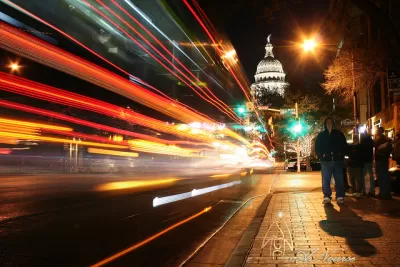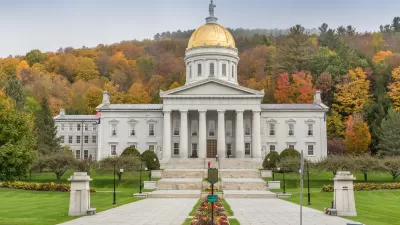Creating a new version of the "haves" and the "have nots," Richard Florida distinguishes cities struggling against state-level anti-urban policies from cities that get more support from the state.

Richard Florida opens his latest article for CityLab by sharing a familiar refrain heard in blue cities located in red states: "The folks in our state government and state legislature are against us." According to Florida's take, the problem is worsening in the Trump era of U.S. politics, and "a growing number of cities and metro areas are also located in states which are actively undermining their interests."
To quantify the damage that anti-urban state policies can have on urban localities, Florida worked with his Martin Prosperity Institute (MPI) colleague, Patrick Adler, to build an infographic to separate the state-supported local urban areas, from the state-obstructed local urban areas. Following the chart, Florida lists some of the anti-urban policies that have earned states like Texas, Georgia, North Carolina, and Arizona their reputation.
"This split between states is becoming yet another factor in America’s deepening spatial inequality," writes Florida. "Over time, the relatively small group of cities and metros in pro-urban states are likely to develop even deeper advantages in attracting talent and building the knowledge economy."
FULL STORY: Anti-Urban States Aren't Just Hurting Their Cities

Planetizen Federal Action Tracker
A weekly monitor of how Trump’s orders and actions are impacting planners and planning in America.

Maui's Vacation Rental Debate Turns Ugly
Verbal attacks, misinformation campaigns and fistfights plague a high-stakes debate to convert thousands of vacation rentals into long-term housing.

Restaurant Patios Were a Pandemic Win — Why Were They so Hard to Keep?
Social distancing requirements and changes in travel patterns prompted cities to pilot new uses for street and sidewalk space. Then it got complicated.

In California Battle of Housing vs. Environment, Housing Just Won
A new state law significantly limits the power of CEQA, an environmental review law that served as a powerful tool for blocking new development.

Boulder Eliminates Parking Minimums Citywide
Officials estimate the cost of building a single underground parking space at up to $100,000.

Orange County, Florida Adopts Largest US “Sprawl Repair” Code
The ‘Orange Code’ seeks to rectify decades of sprawl-inducing, car-oriented development.
Urban Design for Planners 1: Software Tools
This six-course series explores essential urban design concepts using open source software and equips planners with the tools they need to participate fully in the urban design process.
Planning for Universal Design
Learn the tools for implementing Universal Design in planning regulations.
Heyer Gruel & Associates PA
JM Goldson LLC
Custer County Colorado
City of Camden Redevelopment Agency
City of Astoria
Transportation Research & Education Center (TREC) at Portland State University
Jefferson Parish Government
Camden Redevelopment Agency
City of Claremont





























